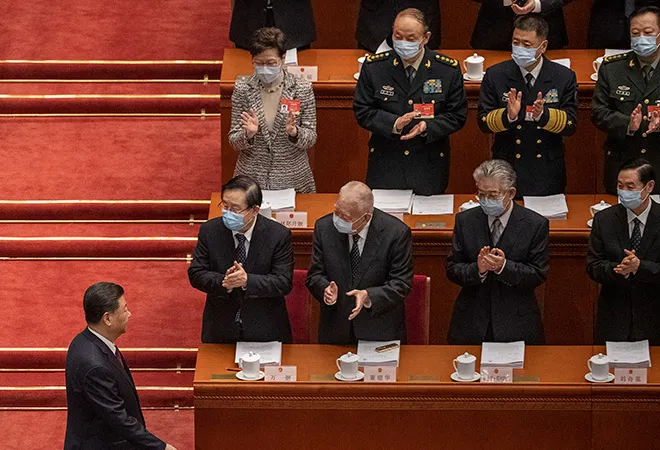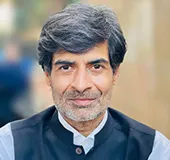
The Communist Party of China will celebrate the 100th anniversary of its founding this July. This marks the first significant milestone in Chairman Xi’s “China Dream”, a project that will ostensibly culminate in 2049, the 100th anniversary of the founding of the People’s Republic, with associated aspirations of China cementing its position as a global power. In our book, Pax Sinica, we had detailed three instruments that are crucial to these ambitions: Leadership over global institutions and processes, a conducive environment for achieving “discourse power”, and the construction of new international coalitions. China seeks to control global institutions and rule-making processes, grease and dominate the media and public sphere into a favourable disposition, and enter into perverse partnerships with other nations, described as a “loan for sovereignty” arrangement in one of its avatars.
The onset of the pandemic has made many of these strategies more visible, even as it highlighted the opportunities and challenges that lie ahead for China.
China’s global dominance strategies
For the past decade or more, China has pursued a dual strategy of co-opting post-war institutions while simultaneously pursuing its own brand of multilateralism through the Belt and Road Initiative (BRI) and an assortment of formal and informal fora, such as the Shanghai Cooperation Organisation. Three approaches guide China’s strategy: Building global influence and prestige; shaping and/or altering key norms, standards, and processes; and creating the capacity to withstand pressure for selectively disregarding international rules.
The fruits of these efforts were visible amid the pandemic, most controversially at the WHO, which struggled to balance its commitment towards transparency and accountability, and its operational reliance on and systematic infiltration by China. Under cover of the pandemic, China has made more significant inroads as well. In April 2020, China was appointed to the influential United Nations Human Rights Council (HNRC) consultative group, which plays a crucial role in selecting global monitors for free speech, arbitrary detention and forced disappearances—the very rights that Beijing crushed in Hong Kong and Xinjiang.
One aspect of this ploy of the Communist Party of China (that effectively and absolutely owns the country) that often goes unnoticed in India is China’s leadership in technology standard-setting organisations. Over the past decade, Beijing has improved its representation in, and submissions to, the technical committees and sub-committees of organisations like the International Organisation for Standardisation and the International Electrotechnical Commission. In March 2020, China’s Standardisation Administration published an innocuous document outlining the elements of a more ambitious strategy known as China Standards 2035. The 15-year blueprint will chart a pathway for China to dominate standards in emerging industries, giving it the ability to set the terms of international trade and even define the relationship between technology and society globally.
Augmenting China’s influence in international organisations and standard-setting bodies is its global media and narrative management strategy—an essential facet of “discourse power”
Augmenting China’s influence in international organisations and standard-setting bodies is its global media and narrative management strategy—an essential facet of “discourse power”. Chairman Xi alluded to this in a recent speech, calling for China’s media to develop an “international voice”. The research in our book highlighted what scholars called China’s policy of “borrowing a boat to go out into the ocean”. In other words, China’s use of paid inserts and large advertisements in newspapers allows it to propagate its narratives. Two recent reports provide insight into how significantly these efforts have evolved and intensified.
The first, by the Associated Press and the Oxford Internet Institute, describes China’s use of bots and fake social media accounts to amplify its “wolf warrior” diplomats and their proxies online. While China has previously used these tactics in Taiwan and Hong Kong, such operations have taken on a global scope amid the pandemic. Beijing’s appetite for misinformation, exemplified famously by Zhao Lijian’s claim that the coronavirus originated outside China, only exacerbated the challenge. The second, from the International Federation of Journalists, posits that Beijing’s strategy of syndication appears to be paying off. Over the year, its inserts into local media, increasingly in vernacular, along with a more engaged diplomatic community, have bolstered its visibility in the developing world.
Beyond its media strategy, China continues to fund educational institutions through opaque means, sometimes with attached costs to academic freedom. The Communist Party also increasingly hosts foreign diplomats and security officials for training programmes on “information management” and sponsors ruling party politicians around the world to attend training sessions on party building and governance. In 2020, under pressure from Western scrutiny, Beijing rebranded its infamous Confucius Institutes and handed over operations to a ‘non government organisation’ defined by the party. However, the US and Europe aren’t necessarily the targets of its educational and cultural investments. A report from Aid Data in 2018 revealed that countries that are more aligned with China’s foreign policy receive the bulk of its largesse. While it is unclear yet what gains have accrued to Beijing from such initiatives, they represent a formidable institutionalised apparatus to export its ideology and political practices.
The Communist Party also increasingly hosts foreign diplomats and security officials for training programmes on “information management” and sponsors ruling party politicians around the world to attend training sessions on party building and governance
Backdoor entry into the EU
Finally, we had highlighted China’s strategy of building new coalitions and undermining existing ones. Nowhere was this more apparent than Europe, where Beijing’s 17 + 1 platform for engaging with Central and East European (CEE) nations had triggered concern about its “divide and rule” tactics. To some extent, China's investments in the region have paid off— with countries like Greece and Hungary scuttling the EU’s efforts to criticise China’s violations of international law in the South China Sea and the passing of the national security law abuses in Hong Kong.
2020 dampened this momentum for China—and demonstrated that large powers can still secure their peripheries. Several East and Central European leaders expressed dissatisfaction with the pace of investments and many were no-shows at the China-led forum. Many have also signed onto the US’s Clean Network Initiative, intended to prevent the entry of China’s 5G companies into key markets. The Baltic states, meanwhile, were more apprehensive about Russia than they were keen on Chinese investments.
Nevertheless, the 17 + 1 platform is but one instrument in China’s more global “perverse diplomacy” toolkit, and writing it off is premature. It marks a permanent presence that China now enjoys at the EU’s doorstep, one that the CEE can always leverage for better terms from Brussels. At the very least, China is now a voice in domestic EU debates.
China also hosts a web of high-level forums and summits in nearly every part of the world, including the Arab states, Africa, Latin America, and the ASEAN. Beijing’s vaccine diplomacy has won it praise in most of these geographies—especially in the face of Western absence and selfish acts of the past year. These forums augment and bolster various initiatives, ranging from China’s infrastructure investments to promoting its technology propositions. And its economic presence and investments are buying it diplomatic support as well. For instance, the support of African states has been crucial for China when its record in Xinjiang and Hong Kong was questioned in the UN in 2020 and 2019.
When looking at the pandemic in retrospect, Chinese leaders will likely see parallels to the 2008 financial crisis—one more milestone in the long decline of the West, and China’s rise. Beijing robustly managed the pandemic at home and stepped up to provide global public goods. To be sure, it faces new headwinds: Public opinion of China has plummeted in the West, the Biden administration is gearing up for great power competition, the EU has ‘frozen’ its latest investment deal with China, and institutions like the G7 are stepping up to offer alternatives to the BRI.
Public opinion of China has plummeted in the West, the Biden administration is gearing up for great power competition, the EU has ‘frozen’ its latest investment deal with China, and institutions like the G7 are stepping up to offer alternatives to the BRI
Elsewhere, the message from China over the past year is resilience and continuity. It remains committed to an alternative form of globalisation via the BRI. Its influence over international institutions will only grow, proportional to its wealth and power. Beijing’s media is increasingly savvy in projecting and protecting its core interests. Further, contrary to the perception that China is “friendless”, it can call upon nations to support it when it matters. And even when there is pushback, it is often haphazard. The recently announced “Build Back Better World”, while grand in intent, struggles with the contradictions within the group on their assessment of the Middle Kingdom. Key countries have chosen trade over security and valuations over values in their engagement with China.
The future of the Indo-China relationship
Where does this leave India? Our book warned that Doklam was unlikely to be the last border confrontation between the two Asian powers. We argued that it opened a new tense period between India and China—an Asian Cold War. The Galwan Valley Clash confirmed the advent of a new era of high altitude faceoffs with possible ramifications in the oceans as well. This rift has only grown wider amid the pandemic. China’s belligerence in the Himalayas, and India’s restriction on Chinese technology platforms as well as its alignment with coalitions competing with China have all but cemented contestation. This will drive engagement in the years ahead.
New Delhi will confront a more fundamental dilemma: On the one hand, political tensions with China will remain high. But on the other, it is dependent on trade with China for its economic objectives—a dependence that will likely remain given the adverse economic consequences of the pandemic. Indeed, data published by Chinese customs officials revealed that trade with India boomed in 2021, even as Beijing appears to be consolidating its position in the Himalayas. How India resolves this contradiction and builds a security posture that accounts for this will indeed define the relationship.
New Delhi needs clarity of thought and a national consensus on China. In the coming days, it will have to take a leaf out of the Chinese playbook and engage in trade with the one that seeks to do it harm. Its economic engagement must be alive to this and its security considerations immune from these entanglements. It must realise that it cannot trade or talk its way into a better relationship with Beijing. These are important but essentially sideshows to the principal theatre of engagement. Deceit and political muscularity is the new grammar of the bilateral that China has proffered. With limited recourse available, the time for India’s legendary ambiguity is long past.
PAX SINICA: Implications for the Indian Dawn, by Samir Saran and Akhil Deo, is available here.
The views expressed above belong to the author(s). ORF research and analyses now available on Telegram! Click here to access our curated content — blogs, longforms and interviews.




 PREV
PREV



